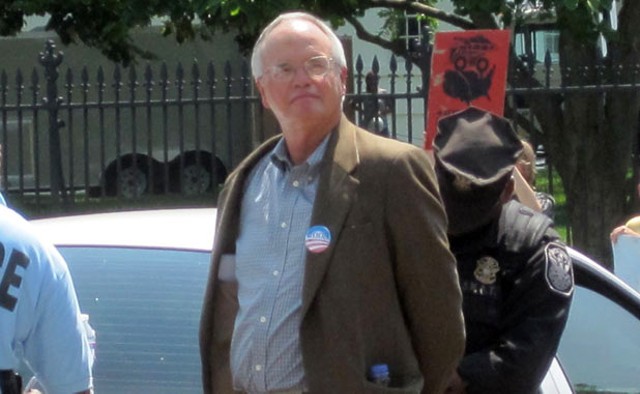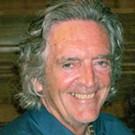Published November 16, 2011 at 12:15 p.m.
Balding, bespectacled Gus Speth stood out among the 50-odd protesters gathered at the White House gates. At 69, Speth was a couple of generations older than most of those congregated last August on the first day of a two-week series of sit-ins against a proposed Canada-to-Texas oil pipeline.
But it wasn’t just his age: Speth stood out for his clothing too, wearing a brown suit jacket on that hot summer afternoon. As he was led away in handcuffs, Speth could look over his shoulder at the building where he had worked 30 years earlier as chairman of President Jimmy Carter’s Council on Environmental Quality. Two years ago, Speth added Vermont Law School professor to an already impressive résumé that qualifies him as one of the most distinguished figures in the nation’s environmental movement.
What motivated Speth’s journey from the White House to the big house? Simply put, it’s that, for the past three decades, the United States has essentially ignored an environmental crisis that imperils the future of humankind.
Speth proudly recalls that the Carter administration issued three prophetic reports on climate change. Congress likewise cooperated in the 1970s with both Republican and Democratic presidents to enact landmark laws to improve air and water quality and to rescue species on the edge of extinction.
But that golden age gave way to an era of dross, Speth laments. “The problem of climate change has gotten horrendous, and nothing has been done about it. Europe, Japan and others have shown they’re ready to act, but we’ve not even tagged along, much less led,” Speth says.
And so the Yale-trained lawyer who clerked for a U.S. Supreme Court justice decided he had to break the law. He and fellow climate-change activist Bill McKibben joined 1200 activists carted away by the feds as they sought to dramatize their opposition to a pipeline that would slice through the North American heartland. With “America’s insatiable appetite for gasoline” setting up a “carbon bomb,” Speth says he knew he had to “break out of the system.”
That was both a courageous and catalyzing action on the part of someone with such impeccable establishmentarian credentials, McKibben observes. “Unlike most people, he managed as he got older to adjust his worldview,” McKibben says of Speth. “The argument in his last few books came down to ‘much of what I’ve done in my life didn’t work.’”
But this new course of direct action did work. The Obama administration announced on November 10 — four days after Speth and McKibben had returned to the White House, this time with 12,000 demonstrators — that it will put off a decision on the pipeline until after the president’s current term in office.
That marks a major victory for climate-change forces, McKibben declares, suggesting that Speth’s role may have been pivotal. He says Washington’s mainstream green groups were galvanized two months ago by the sight of a revered elder going to jail for the sake of his eco-principles. Influential organizations such as the Natural Resources Defense Council and the World Resources Institute — both of which Speth founded — let the Obama administration know they stood behind those penned in what McKibben calls the “weird and scary” D.C. Central Cell Block.
It was not a congenial place to spend 48 hours, Speth recollects. “We had to sleep on slabs of stainless steel with no blankets and no pillow,” he relates. “We were given, literally, bread and water twice a day. But the spirit in there was wonderful.”
The initial group of about 50 jailed protesters made use of the “human microphone” a few weeks before Occupy Wall Street popularized that method of amplification, Speth notes. “‘Yo, Speth,’” he says one of the detainees called out, “‘you’re a professor, so give us a lecture.’”
He proceeded to summarize the thesis of a book he’s writing with the tentative title America, Rising to Its Dream. It’s a critical analysis of the current political and economic system as well as an appeal for a social movement that will replace it with something more humane. Speth recently delivered a series of related public lectures at Vermont Law School.
Speth’s recent resort to direct action notwithstanding, he remains a scholar at heart. He’s written or edited four books on environmental and political themes in addition to serving for 10 years as dean of the Yale Graduate School of Forestry & Environmental Studies.
Speth’s latest manuscript may turn out to be more upbeat in tone than would have been the case several months ago. The nationwide upsurge of protests against economic inequalities could mark the “great turning we’ve been waiting for,” he suggests. “Every progressive I know is praying that Occupy is the beginning of a strong popular movement.”
Although he still speaks with the lilting cadence of his native South Carolina, Speth says he feels wholly at home in Strafford, where he and his wife, Cameron, raise chickens on a hill with “a great Vermont view.” In his concluding lecture at VLS earlier this month, Speth laid out a vision for what America could become. He says he told his hundreds of listeners in South Royalton, “This may sound a lot like what Vermont already is.”
Speth remains marked by the Carolinas in other ways. Industrial poisoning of a mountain lake near his grandparents’ home in North Carolina propelled him onto a path that led to his leadership of the United Nations Development Program, as well as to an awareness of the connections between poverty and pollution. During his time as an administrator of the world body, Speth was the highest-ranking American working at the UN.
He was lured to Vermont Law School by its dean, Geoffrey Shields, who had gotten to know Speth through the Vermont institution’s joint degree program with the Yale graduate environmental program. “When I heard Gus was thinking about buying a home in Vermont, I worked hard on getting him,” Shields says.
Speth’s presence has been a boon to Vermont Law School, Shields adds. Not only does he help attract high-caliber students and faculty, the addition of so distinguished a professor has persuaded some foundations to look more favorably on the school’s grant applications, Shields says.
But Speth is much more than a shiny hood ornament. “He brings deep experience outside academia as well as a really strong teaching capability,” Shields says. Speth remembers all of his students’ names, and his courses are so popular that the school had to add a section to a seminar he teaches on environmental law, Shields notes.
Isn’t there something objectionable about a law school professor who defies the law?
Not at all, Shields insists. “There’s a proud tradition of civil disobedience by academics from the time of Vietnam and earlier,” he remarks. “It’s one way of calling attention to crucial issues to which society and government don’t seem to be responding adequately. The community here is very proud of Gus,” Shields declares, “and so am I.”
More By This Author
Speaking of...
-

Video: Plainfield Recovers From Catastrophic Flood
Jul 25, 2024 -

iSun, Parent Company of SunCommon, Declares Bankruptcy
Jun 7, 2024 -

Q&A: Volunteer Leonard Prive Picks Up Roadside Litter Between Underhill and Westfield
Jun 5, 2024 -

Video: Volunteer Leonard Prive Picks Up Roadside Trash Between Underhill and Westfield
May 30, 2024 -

Youth Conservation Crews Head Out to Repair Damage From 2023 Floods
May 22, 2024 - More »
Comments
Comments are closed.
From 2014-2020, Seven Days allowed readers to comment on all stories posted on our website. While we've appreciated the suggestions and insights, right now Seven Days is prioritizing our core mission — producing high-quality, responsible local journalism — over moderating online debates between readers.
To criticize, correct or praise our reporting, please send us a letter to the editor or send us a tip. We’ll check it out and report the results.
Online comments may return when we have better tech tools for managing them. Thanks for reading.












































